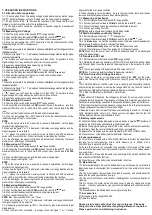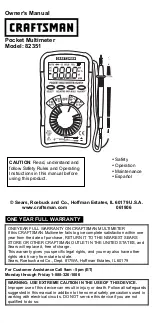
7. OPERATING INSTRUCTIONS
7-1 Attention before operation
7-1-1 Check battery. When the battery voltage drop below proper operation range,
the “ ” symbol will appear on the LCD display and the battery need to changed.
7-1-2 Pay attention to the “
” besides the input jack which shows that the input
voltage or current should be within the specified value.
7-1-3 The range switch should be positioned to desired range for measurement
before operation.
7-2 Measuring DC Voltage
7-2-1 Set the rotary switch at the desired “V
”
range position.
7-2-2 Connect the black test lead to COM jack and the red to VΩ
jack.
7-2-3 Connect test leads across the source or load under measurement.
7-2-4 You can get reading from LCD. The polarity of the red lead connection will be
indicated along with the DC voltage value.
NOTE:
1. When the value scale to be measured is unknown beforehand, set the range selector at
the highest position.
2. When only the figure “1” or “-1” is displayed, it indicates over-range situation and the higher
range has to be selected.
3. “
” means you can’t input the voltage more than 1000V, it’s possible to show
higher voltage, but it may destroy the inner circuit or pose a shock.
4. Be cautious against shock when measuring high Voltage.
7-3 Measuring AC Voltage
7-3-1 Set the rotary switch at the desired “V
”
range position.
7-3-2 Connect the black test lead to COM jack and the red to VΩ
jack.
7-3-3 Connect test leads across the source or load under measurement.
7-3-4 You can get reading from LCD.
NOTE:
1. When the value scale to be measured is unknown beforehand, set the range selector at
the highest position.
2. When only the figure “1” or “-1” is displayed, it indicates over-range situation and the higher
range has to be selected.
3. “
” means you can’t input the voltage more than 750V, it’s possible to show
higher voltage, but it may destroy the inner circuit or pose a shock.
4. Be cautious against shock when measuring high Voltage.
7-4 Measuring DC Current
7-4-1 Set the rotary switch at the desired “A
”
range position.
7-4-2 Connect the black test lead to COM jack and the red to the mA
jack for a
maximum 200mA current , for a 200mA to 20A current, move the red lead to the 20A
jack.
7-4-3 Connect test leads in series with the load under measurement.
7-4-4 You can get reading from LCD. The polarity of the red lead connection will be
indicated along with the DC current value.
NOTE:
1. When the value scale to be measured is unknown beforehand, set the range
selector at the highest position.
2. When only the figure “1” or “-1” is displayed, it indicates over-range situation and the
higher range has to be selected.
3. “
” means the socket mA’s maximum current is 200mA and 20A’s maximum
current is 20A, over 200mA or 20A current can be protected by the fast fuse.
4. On the 20A range, the measuring time should be less than 10 seconds to prevent
precision from affecting by circuit heating.
7-5 Measuring AC Current
7-5-1 Set the rotary switch at the desired “A
”
range position.
7-5-2 Connect the black test lead to COM jack and the red to the mA
jack for a
maximum 200mA current , for a 200mA to 20A current, move the red lead to the 20A
jack.
7-5-3 Connect test leads in series with the load under measurement.
7-5-4 You can get reading from LCD.
NOTE:
1. When the value scale to be measured is unknown beforehand, set the range
selector at the highest position.
2. When only the figure “1” or “-1” is displayed, it indicates over-range situation and the
higher range has to be selected.
3. “
” means the socket mA’s maximum current is 200mA and 20A’s maximum
current is 20A, over 200mA or 20A current can be protected by the fast fuse.
4. On the 20A range, the measuring time should be less than 10 seconds to prevent
precision from affecting by circuit heating.
7-6 Measuring Resistance
7-6-1 Set the rotary switch at the desired “
Ω
” range position.
7-6-2 Connect the black test lead to COM jack and the red to VΩ
jack.
7-6-3 Connect test leads across the resistance under measurement.
7-6-4 You can get reading from LCD.
NOTE: Max. input overload: 500V rms
<
10sec
1. When only the figure “1” or “-1” is displayed, it indicates over-range situation and
the higher range has to be selected.
2. For measuring resistance above 10M
Ω
, the mete may take a few seconds to get
stable reading.
3. When the input is not connected, i.e. at open circuit, the figure “1” or “-1” will be
displayed for the over-range condition.
4. When checking in-circuit resistance, be sure the circuit under test has all power
removed and that all capacitors have been discharged fully.
7-7 Measuring Capacitance
7-7-1 Set the rotary switch at the desired “F
”
range position.
7-7-2 Connect the black test lead to COM jack and the red to mA
jack.
7-7-3 Connect test leads across the capacitance under measurement.
7-7-4 You can get reading from LCD.
NOTE: Capacitors should be discharged before being tested.
7-8 Diode & Audible continuity Testing
7-8-1 Set the rotary switch at the “
” range position.
7-8-2 Connect the black test lead to COM jack and the red to VΩ
jack.
7-8-3 On diode range, connect the test leads across the diode under measurement,
display shows the approx. forward voltage of this diode.
7-8-4 On Audible continuity range, connect the test leads to two point
of circuit, if the resistance is lower than approx. 50Ω, the buzzer sounds.
NOTE: Make sure the power is cut off and all capacitors need to be discharged
under this measurement.
7-9 Transistor hFE Test
7-9-1 Set the rotary switch at the desired “hFE” range position.
7-9-2 Determine whether the transistor is NPN or PNP and locate the Emitter, Base
and Collector leads. Insert the leads into the proper holes in the socket on the front
panel.
7-9-3 You can get reading of the approximate hFE value from LCD.
NOTE: Don’t connect an external voltage to measuring terminals.
7-10 Non Contact AC Voltage detection
7-10-1 Power on the meter, on any range, press and hold the “NCV” key, the meter
enters Non Contact AC Voltage (NCV) detection, the NCV green LED light will light
up.
7-10-2 Hold the Meter so that the mater’s top is vertically and horizontally centered
and contacting the conductor, when the live voltage ≥90V AC rms, the NCV red LED
light and green LED light will light up alternately together with sound.
7-10-3 Free the “NCV” key to exit the NCV meter mode.
NOTE:
1. Even without LED indication, the voltage may still exist. Do not rely on non-contact
voltage detector to determine the presence of voltage wire. Detection operation may
be subject to socket design, insulation thickness and different type and other factors.
2. When the meter input terminals presence voltage, due to the influence of presence
voltage, voltage sensing indicator may also be bright.
3. Keep the meter away from electrical noise sources during the tests, i.e., florescent
lights, dimmable lights, motors, etc.. These sources can trigger Non-Contact AC
Voltage detection function and invalidate the test.
8. Battery replacement
8-1 When the battery voltage drop below proper operation range the " " symbol will
appear on the LCD display and the battery need to changed.
8-2 Before changing the battery, power off the meter and remove the test leads from
the terminals. Open the cover of the battery cabinet by a screwdriver.
8-3 Replace the old battery with the same type battery (9V 6F22 or NEDA 1604).
8-4 Close the cover of the battery cabinet and fasten the screw.
9. Fuse replacement
9-1 This meter is provided with a 200mA/500V fast fuse to protect the capacitance
test and the current measuring circuits which measure up to 200mA, with a
20A/500V fuse to protect the 20A range.
9-2 Ensure the meter is not connected to any external circuit, power off the meter
and remove the test leads from the terminals. Open the cover of the battery cabinet
by a screwdriver.
9-3 Replace the old fuse with the same type and rating: 6×30mm 200mA/500V fast
fuse or 6×30mm 20A/500V fast fuse.
9-4 Close the cover of the battery cabinet and fasten the screw.
10. Maintenance
10-1 Before attempting to remove the battery door or open the case, be sure that test
leads have been disconnected from measurement circuit top avoid electric shock
hazard.
10-2 You must replace the test leads if the lead is exposed, and should adopt the
leads with the same specifications as origin.
10-3 Use only moist fabric or small amount of detergent but not chemical solution for
cleaning.
10-4 Do not use the meter before the back cover is properly closed and screw
secured. Upon any abnormality, stop operation immediately and send the meter for
maintenance.
10-5 Please take out the battery when not using for a long time.
11. Accessories
[1] Test Leads: electric rating 1000V 20A
[2] Operator’s Manual
Above picture and content just for your reference. Please be
subject to the actual products if anything different or updated.
Please pardon for not informing in advance.




















